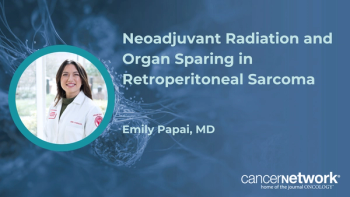
Lenvatinib Combo Yields Benefit Regardless of IMDC Risk in Advanced RCC
Lenvatinib in combination with pembrolizumab appears to raise no new safety signals in patients with advanced clear cell renal cell carcinoma after 4 years of follow-up in the phase 3 CLEAR study.
Thomas E. Hutson, DO, PharmD, FACP spoke with CancerNetwork® about the overall survival (OS) and progression-free survival (PFS) benefits of lenvatinib (Revlimid) plus pembrolizumab (Keytruda) based on International Metastatic RCC Database Consortium (IMDC) disease risk statuses among patients with advanced renal cell carcinoma (RCC) after 4 years of follow-up in the phase 3 CLEAR study (NCT0281186).
Hutson, director of the Urologic Oncology Program and co-chair of the Urologic Cancer Research and Treatment Center at Baylor University Medical Center in Dallas, as well as a professor of Medicine at Texas A&M College of Medicine, stated that the benefits of pembrolizumab plus lenvatinib were consistent regardless of IMDC risk status. Additionally, he indicated that the study regimen did not produce any new safety signals, and any adverse effects (AE) were considered manageable with dose modifications.
According to data presented at the
Transcript:
We also did some analyses where we were looking at both [OS] and [PFS] benefit based upon prognostic risk group. We looked at the favorable, intermediate, and poor IMDC risk groups and were able to show a benefit with each of those groups throughout the duration. We also looked at the degree of tumor shrinkage.
We know that for the majority of [patients who] receive lenvatinib and pembrolizumab, upwards of 90% to 95% of them will at least have stable disease when they receive this therapy. Their amount of tumor shrinkage that they receive correlates with the [PFS] and [OS] that they [experience]. If you're in a group of patients who have near complete responses, you do better for longer than patients who have less tumor response. Finally, we also looked at toxicity and we're able to show that there were no new toxicity signals with longer follow-up.
At the end of the day, we were able to really report with further follow-up and 4 years of data, that the overall survival, progression-free survival, and response rates remain robust throughout the duration, and that there were no new safety signals. The safety and [AEs] were handled with dose modifications, dose interruptions, and dose reductions as needed in the trial.
Reference
Motzer RJ, Porta C, Eto M, et al. Final prespecified overall survival (OS) analysis of CLEAR: 4-year follow-up of lenvatinib plus pembrolizumab (L+P) vs sunitinib (S) in patients (pts) with advanced renal cell carcinoma (aRCC). J Clin Oncol. 2023;41(suppl 16):4502. doi:10.1200/JCO.2023.41.16_suppl.4502
Newsletter
Stay up to date on recent advances in the multidisciplinary approach to cancer.







































